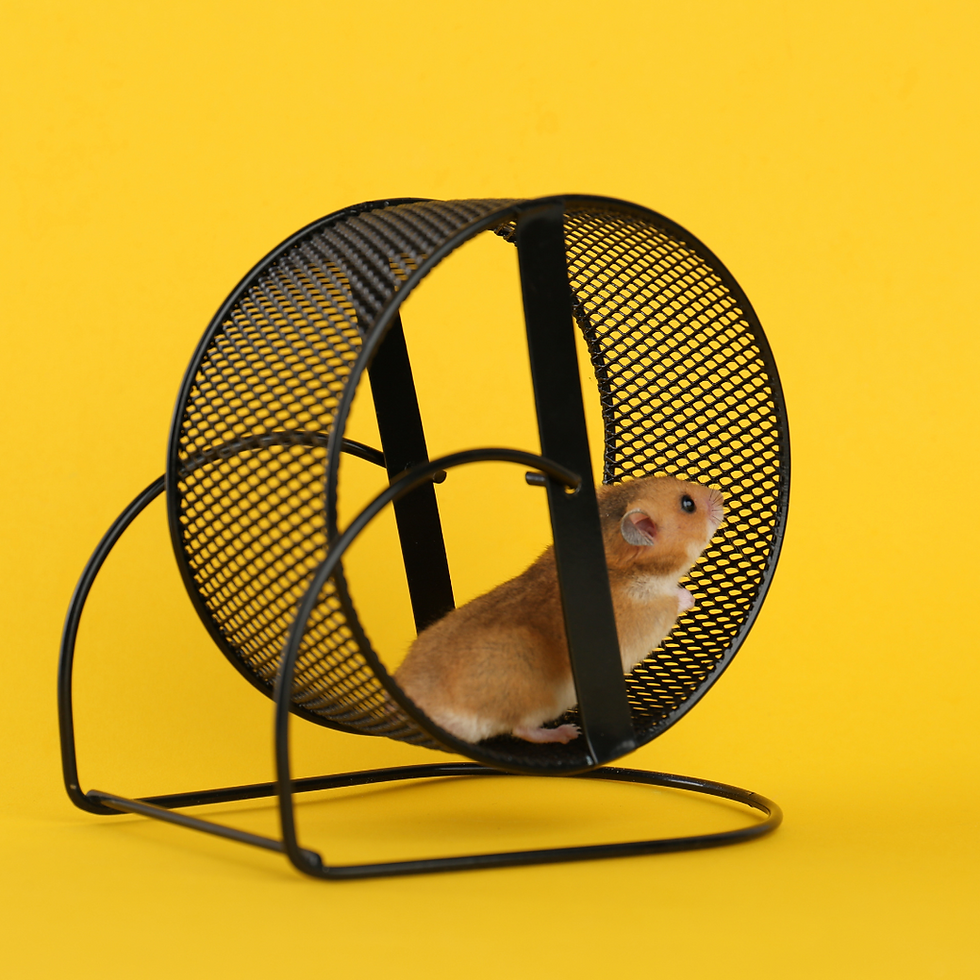Behavioural Science: Why Parents Stay on the Hamster Wheel After Summer and How to Step Off It
- Grounded Research

- Aug 10, 2025
- 3 min read
September should be the month when we finally exhale — kids back at school, routines restored, the chaos of summer behind us.
But for many parents, the pace doesn’t slow. The adrenaline-fuelled, military-planned rhythm of the summer holidays bleeds into autumn, and before we know it, we’re still running at full speed right up to Christmas.

From a behavioural science perspective, this is predictable. Here is why it's easy to stay spinning...
Status quo bias (Kahneman, Knetsch & Thaler, 1991) means once we’ve adapted to operating at maximum speed, that speed feels like the “new normal.” Our brains prefer to keep things as they are rather than face the perceived costs of change.
Loss aversion makes slowing down feel like giving something up, whether it’s productivity, family “quality time,” or our sense of being on top of things, even if the gains from rest would outweigh the losses.
Hedonic adaptation (Loewenstein & Ubel, 2008) means that the intense, high-energy pace quickly becomes our baseline. We no longer feel the same “rush” from it, but we keep it up because our minds and bodies have recalibrated to expect it.
Instant gratification bias hooks us into chasing quick wins — the ticked-off to-do list, the solved crisis, the successful juggling act, delivering dopamine hits that are harder to find in slower, more reflective routines.
And the urgency effect means we continue prioritising what feels immediate over what’s truly important, even after the school-holiday chaos has ended.
The result? We stay on the hamster wheel long after we need to flying close to burn out right through until Chrtistmas forces a stop.
The good news is we can use behavioural science to deliberately step off the speeding train and reprogram our pace. Here are 5 things I am going to do to 'hack' my brain and make sure I don't fall into the pattern once again this year.
1. Use a “pattern break” to disrupt autopilot
The science: Habit loops are triggered by cues — same environment, same time of day, same people. Without a conscious break, your brain assumes the pace should continue.
What to do: Within the first week of term, insert one deliberate change to your environment or schedule (if you have managed to find some normality in juggling!) a mid-morning walk, a different desk setup, an hour dedicated to a clear out or starting the day with 5 minutes of journaling instead of checking emails.
2. Reframe your time with “implementation intentions”
The science: Peter Gollwitzer’s research shows we’re more likely to follow through on new behaviours when we create “if-then” plans.
What to do: Write down: “If it’s 3:30pm, then I will take 10 minutes to decompress before doing school pick-up” or “If I check my emails at night, then I will close my laptop after 15 minutes.” Specificity turns vague intentions into action.
3. Switch from urgency mode to importance mode
The science: The “urgency effect” makes us prioritise short-term tasks over long-term well-being — even if the latter matters more.
What to do: Each morning, list three important things you want to happen that day — one work, one family, one for yourself. Everything else is a bonus. This helps rewire your brain to value non-urgent priorities.
4. Create a decompression micro-habit
The science: BJ Fogg’s Tiny Habits model shows that small, easy wins anchor new routines more effectively than big lifestyle overhauls.
What to do: Anchor a calming habit to an existing one “After I put the kettle on, I’ll do two minutes of deep breathing” or “After school drop-off, I’ll walk once around the block before going home.” Over time, these micro-moments reduce baseline stress.
5. Make “default slow” your new normal
The science: Behavioural defaults work because our brains conserve energy by sticking with the path of least resistance.
What to do: Build in structural slow-downs — no meetings before 9:30am on Fridays, a no-phone hour after dinner, or one weekend day with no scheduled activities. When slowness is the default, busyness becomes the exception.
Notice the habits you’ve carried forward from summer, and think back to what June looked like. Break the ones that no longer serve you, and replace them with slower, more intentional rhythms. Your brain, your kids, family and even the dogs, but most importantly, your December self, will thank you.
Please share any tips of your own!








Comments